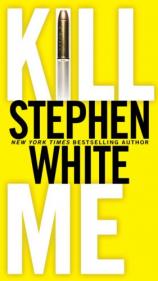Reading Group Guide
Discussion Questions
Kill Me

1. The story opens with the psychologist's point of view then switches to the protagonist's. Why do you think Stephen White made this choice? How does it enhance the suspense?
2. At the beginning of the story, we do not know what the narrator is suffering from. Why does the author choose to keep this a secret?
3. How do you feel about the Death Angels when we first are told about them?
4. How does the main character's flirtation with danger-his obsessions with driving dangerously and skiing dangerously --- seem essential to the story and his pact with the Death Angels?
5. At the beginning of Kill Me, the narrator is not entirely sympathetic. Does this change over the course of the novel?
6. What does Antonio's story have to do with the narrator's story?
7. The skiing accident is essential to the plot. What does it allow Stephen White to introduce?
8. How does the narrator's friend, Jimmy Lee, turn out to be important?
9. The discussion between Jimmy Lee and the narrator provides Stephen White with the perfect opportunity to address questions that the reader might have about the narrator's choice. How does the author make our narrator's decision to be killed by the Death Angels plausible? Is this decision one you can relate to?
10. How has the narrator changed since becoming a businessman?
11. Are the narrator and the psychologist similar?
12. How do the Death Angels entice the narrator into agreeing to a pact with them? What do they use as an inducement?
13. Why does the Death Angel woman bring up Adam? How does the existence of the narrator's son, Adam, affect his decision?
14. How was the narrator different at 23?
15. Is the narrator too trusting?
16. The narrator believes that his quality of life is most important. (There's a certain irony in a man who likes to gamble with his life making sure he has a "safe" death.) Does his understanding of what is important in life change by the end of the novel and how does it change?
17. How are Adam and his father similar/different?
18. How is the knowledge that Adam's stepfather killed himself important? What scene does it echo?
19. Why is the narrator's relationship with his son crucial?
20. Why does the narrator become obsessed with Lizzie?
21. How is the narrator's choice to kill himself different from a "Dr. Kerkovian thing. And it's not a Terry Schiavo thing. I'm talking about something else, about ending my life on my own terms while I'm still well enough to do so, so that I die before I become disabled mentally, or disabled physically, or before I become debilitated by pain…" Do you agree with the narrator's decision?
22. How do you perceive the Death Angels? Does your view of the Death Angels change over the course of Kill Me?
23. Referring to Dimitri, Lizzie says, "He wasn't murdered. He was executed. The difference is significant?" Do you agree?
24. How is Connie, the narrator's brother, important to the story? What alternative does he present?
25. The bargain with the Death Angels initially seems reasonable to the narrator but what changes? What does the narrator realize he is giving up?
26. Why does the author begin his story at the end? What does this allow him to do?
27. What do Lizzie and the narrator have in common?
28. How does the novel end? Does the narrator redeem himself?
29. How is the reader's position privileged?
30. What is the significance of Jimmy Lee's presence at the funeral?








